2019-2020学年高中英语人教版必修三Unit2单元复习教案
- 格式:docx
- 大小:37.92 KB
- 文档页数:9
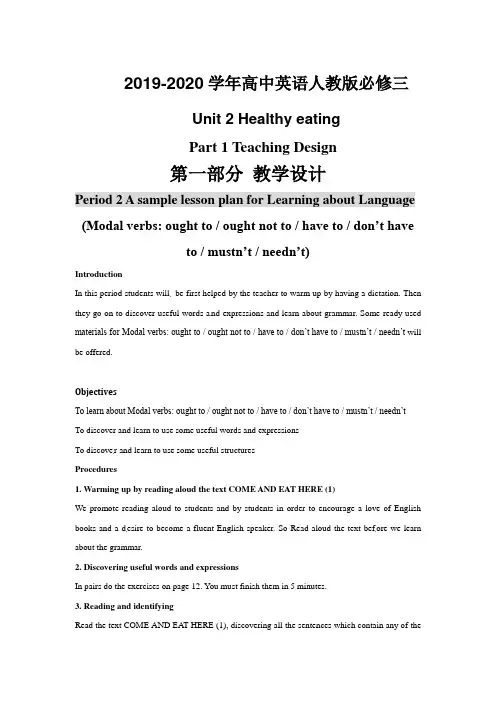
2019-2020学年高中英语人教版必修三Unit 2 Healthy eatingPart 1 Teaching Design第一部分教学设计Period 2 A sample lesson plan for Learning about Language (Modal verbs: ought to / ought not to / have to / don’t haveto / mustn’t / needn’t)IntroductionIn this period students will be first helped by the teacher to warm up by having a dictation. Then they go on to discover useful words a nd expressions and learn about grammar. Some ready used materials for Modal verbs: ought to / ought not to / have to / don’t have to / mustn’t / needn’t will be offered.ObjectivesTo learn about Modal verbs: ought to / ought not to / have to / don’t have to / mustn’t / needn’tTo discover and learn to use some useful words and expressionsTo discove r and learn to use some useful structuresProcedures1. Warming up by reading aloud the text COME AND EAT HERE (1)We promote reading aloud to students and by students in order to encourage a love of English books and a d esire to become a fluent English speaker. So Read aloud the text bef ore we learn about the grammar.2. Discovering useful words and expressionsIn pairs do the exercises on page 12. You must finish them in 5 minutes.3. Reading and identifyingRead the text COME AND EAT HERE (1), discovering all the sentences which contain any of themodal verbs: ought to / ought not to / have to / don’t have to / mustn’t / needn’t.4. Consolidating by doing exercisesTo consolidate your understanding you will be given 10 minutes to go over exercises on page 13. You may just write in your text b ook. I mean the student’s book you are working by.5. Reading the ready u sed materials for Modal verbs: ought to / ought not to / have to / don’t have to / mustn’t / needn’t(用原版)1. What are Modal Verbs?Modal auxiliary verbs help other verbs express a meaning or an idea but have no meaning by themselves. In English, modal auxiliary verbs are defective; for example, they do not have participle forms (no -ing or -ed endings).They are used in a variety of grammatical moods such as the conditional mood, which expresses uncertainty ("I would be delighted if you came to my party").Modal auxi liary verbs are special verbs which behave very differently from normal verbs. Next are some important differences.2. Modal verbs do not take "-s" in the third person.EXAMPLES:He can speak Chinese.She should be here by 9:00.3. You use "not" to make modal verbs negative, even in Simple Present and Simple Past. EXAMPLES:He should not be late.They might not come to the party.4. Many modal verbs cannot be used in the past tenses or the future tenses.EXAMPLES:He will can go with us. NOT CORRECTShe musted study very hard. NOT CORRECTFor reference: (用原排版)ought toexpectation (can use should)e.g. If you like Picasso, you ought to enjoy theexhibition.recommendation (can use should)e.g. You ought to have more driving lessons before youtake the test.criticism (can use should)e.g. You ought not to shout at your mother like that.don’t have to when you don’t need to do something (but you can ifyou want)e.g. You don’t have to go to school if you don’t wantto.have (got) tonecessity, impersonal, not for personal feelings, but f or a rule or situation. If you are unsure whether to use must or have to, it is usually safer to use have to.e.g. I have to get up early tomorrow to catch the train tothe office.must notprohibition (negative order)e.g. You must not leave the table until you havefinished your dinner.needas a normal verbe.g. Do you need me to help you?in questions (less usual)e.g. Need you make so much mess?needn’tnot necessary to do something (unusual)e.g. You needn’t come to the party if you don’t want to.don’t need tonot necessary to do something (more used thanneedn’t)e.g. You don’t need to come t o the party if you don’twant to.6. Closing down by doing a quizModals and Related Expressions1. Ted's flight from Amsterdam took more than 11 hours. He_____ be exhausted after such a l ong flight.A. mustB. canC. had better2. The book is optional. My professor said we could read it if we needed extra credit. But we _____ read it if we don't want to.A. can notB. must notC. don't have to3. Susan_____ hear the speaker because the crowd was cheering so loudly.A. couldn'tB. can'tC. might not4. The television isn't working. It ______ damaged during the move.A. must have beenB. mustC. must be5. A_____ hold your breath for more than a minute?B: No, I can't.A. Are you able toB. Might youC. Can you6. You _____ be rich to be a success. Some of the most successful people I know haven't got a penny to their name.A. can'tB. don't have toC. shouldn't7. I've redone this math problem at least twenty times, but my answer is wrong according to the answer key. The answer in the book _____ be wrong!A. have toB. mustC. should8. You _____ do the job if you didn't speak Japanese fluently.A. can'tB. won't be able toC. couldn't9. You _____ worry so much. It doesn't do you any good. Either you get the job, or you don't. Ifyou don't, just apply for another one. Eventually, you will find work.A. shouldn'tB. don't have toC. can't10. You _____ be kidding! That can't be true.A. shouldB. have toC. ought to11. You _____ leave the table once you have finished your meal and politely excused yourself.A. wouldB. mightC. may12. _____ we move into the living room? It's more comfortable in there and there's a beautiful view of the lake.A. ShallB. MustC. Will13. If I had gone white water rafting with my friends, I _____ down the Colorado River right now.A. would have floatB. would be floatingC. would float14. At first, my boss didn't want to hire Sam. But, because I had previously worked with Sam, I told my boss that he _____ take another look at his resume and reconsider him for the position.A. mustB. ought toC. has to15. You _____ take along some cash. The restaurant may not accept credit cards.A. had betterB. has toC. can16. The machine _____ on by flipping this switch.A. may turnB. could be turningC. can be turned17. I can't stand these people - I _____ get out of here. I'm going to take off for a while you get rid of them.A. mightB. have got toC. had better18. You _____ forget to pay the rent tomorrow. The landlord is very strict about paying on time.A. mustn'tB. don't have toC. couldn't19. Terry and Frank said they would come over right after work, so they _____ be here by 6:00.A. have toB. canC. should20. The lamp _____ be broken. Maybe the light bulb just burned out.A. might notB. must notC. could notKeys: 1-5 BCAAC 6-10 BBCBA 11-15 CABBA 16-20 VBACA。
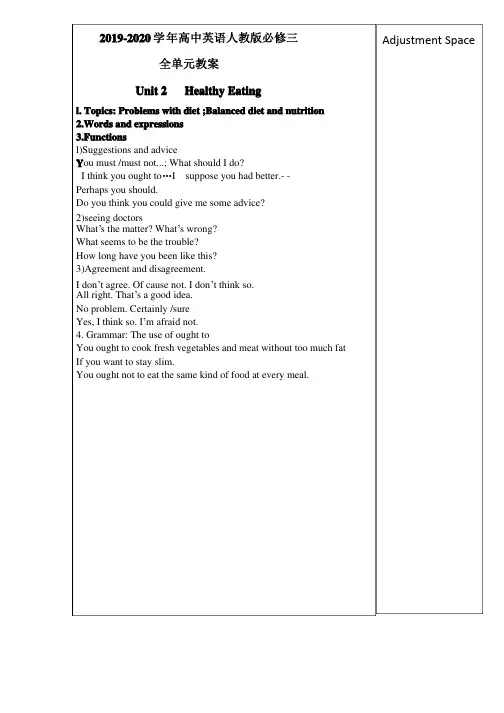
Adjustment Space2019-2020学年高中英语人教版必修三全单元教案Unit 2Healthy Eating l. Topics: Problems with diet ;Balanced diet and nutrition2.Words and expressions3.Functionsl)Suggestions and adviceY ou must /must not...; What should I do?I think you ought to …I suppose you had better.- - Perhaps you should.Do you think you could give me some advice?2)seeing doctors What ’s the matter? What ’s wrong?What seems to be the trouble?How long have you been like this?3)Agreement and disagreement.I don ’t agree. Of cause not. I don ’t think so. All right. That ’s a good idea.No problem. Certainly /sureYes, I think so. I ’m afraid not.4. Grammar: The use of ought toYou ought to cook fresh vegetables and meat without too much fatIf you want to stay slim.You ought not to eat the same kind of food at every meal.Adjustment SpaceUnit 2Healthy Eating Period1 and 2 Step l:.GreetingsThe teacher greet the whole class.Step 2: RevisionReview some words of last period . Step 3:Warming upl.Do you eat a healthy diet? What kind of food do you usually have formeals?1 Are the food you usually eat healthy food or unhealthy food?(Discussin pairs.2. Name some healthy food and unhealthy food.Healthy food unhealthy food.All vegetables: cabbages, Fatty food: French friesPeppers tomatoes potatoes cream roast pork/lambAll fruits: apples, grapes sugary food chocolateStrawberries bananas pears sweets honey ice-cream Dairy products: cheese salty food: biscuitSeafood: shrimp cookiesTofu eggs3. Do you know that the food you eat helps you grow in different ways?Some Will make you fat/tall/thin. Look at the charm below and see which kindof food they eat areFast energy food Slow energy food Body-building food Protective foodsRice sugar Noodles potatoes Spaghetti breadSpaghetti breadCorn dumplings Butter cream Fried bread stickFried cake/chips Dairy productsQuestions:l.Which of these groups of food do you like best?2.Which of them do you eat most often?3.Do you think we should eat each kind of food?3.What will happen if you do not eat a balanced diet?Too much fatty/sugary/salty food will cause many diseases and get toofat.Only protective food will feel weak ,no energy and get too thin .Adjustment SpaceStep 4 Pre-reading Discuss the questions in the chart.(Which food contains more...)2 Order the following food from which contains most to which containslessAnswer: ice-cream, eggs, chicken, rice, peaches Step5 Fast reading and answer the following questions1. What does Wang Pengw ei’s restaurant serve?2. What about Yong Hui’s restaurant?Step 6Intensive reading and find the answers to comprehending.Step7Teaching evaluation(教学评估与反思)Unit 2Healthy Eating Period 3 Language pointsStep l. Lead-in: Listen to the tape to get a better understanding Step nguage points1. Wang Pengwei sat in his empty restaurant feeling very frustrated.feeling very frustrated 现在分词在句中作伴随状语现在分词在句中作伴随状语eg She sat on the chair reading a newspaper .(表伴随)Walking in the street, she met her old friend.(表时间) Seeing no body at home, she decided to eat outside.(表因果)The child fell, striking his head against the ground .(表结果)(表结果)2. His restaurant ought to be full of people.0ught to l , to show a moral duty表示一种道义上的责任,田该表示一种道义上的责任,田该Eg. She ought to look after her child better.1 You ought to study hard to get a high mark.2)ought to have done 表示本应该…,而却没有…Eg.You ought to have come yesterday.3. He thought of his mutton kebabs, fatty pork cooked in the hottest oil过分词短语作后置定语,表被动。
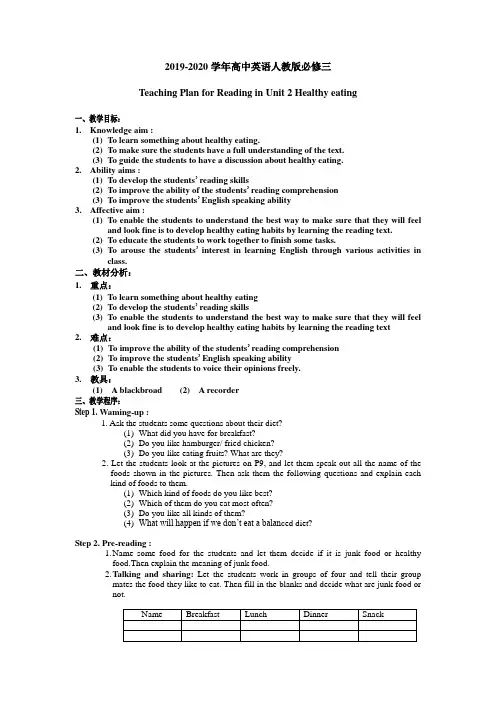
2019-2020学年高中英语人教版必修三Teaching Plan for Reading in Unit 2 Healthy eating一、教学目标:1.Knowledge aim :(1)To learn something about healthy eating.(2)To make sure the students have a full understanding of the text.(3)To guide the students to have a discussion about healthy eating.2.Ability aims :(1)To develop the students’ reading skills(2)To improve the ability of the students’ reading comprehension(3)To improve the students’ English speaking ability3.Affective aim :(1)To enable the students to understand the best way to make sure that they will feeland look fine is to develop healthy eating habits by learning the reading text.(2)To educate the students to work together to finish some tasks.(3)To arouse the students’interest in learning English through various activities inclass.二、教材分析:1. 重点:(1)To learn something about healthy eating(2)To develop the students’ reading skills(3)To enable the students to understand the best way to make sure that they will feeland look fine is to develop healthy eating habits by learning the reading text2. 难点:(1)To improve the ability of the students’ reading comprehension(2)To improve the students’ English speaking ability(3)To enable the students to voice their opinions freely.3. 教具:(1) A blackbroad (2) A recorder三、教学程序:Step 1. Waming-up :1. Ask the students some questions about their diet?(1)What did you have for breakfast?(2)Do you like hamburger/ fried chicken?(3)Do you like eating fruits? What are they?2. Let the students look at the pictures on P9, and let them speak out all the name of thefoods shown in the pictures. Then ask them the following questions and explain eachkind of foods to them.(1)Which kind of foods do you like best?(2)Which of them do you eat most often?(3)Do you like all kinds of them?(4)What will happen if we don’t eat a balan ced diet?Step 2.Pre-reading : some food for the students and let them decide if it is junk food or healthyfood.Then explain the meaning of junk food.2.Talking and sharing: Let the students work in groups of four and tell their groupmates the food they like to eat. Then fill in the blanks and decide what are junk food ornot.Step 3.Fast-reading :1.Skimming : Get the students to look through the title, the last paragraph and pictues,and then guess the main idea of the text.2.Listening : Listen to the recording of the text HEALTHY EATING, and then get themain idea of the text.3.Scanning : Give the students 5 minutes to read the text quickly and finish Execise 1 inComprehending on P11. Then let some students tell me their answers.Step 4.Discussion :Let the students work in groups of four and discuss the strength and weakness of the two restaurants. Then fill in the chart.Step 5.Revision :Let the students to complete the summary of the story with one word in each blank.HEALTHY EATINGWang Pengwei felt 1_________ in an empty restaurant because no 2_______ have come to his restaurant ever since he got up early in the morning. He wanted to find out why. He hurried out and 3_______ Maochang into a newly-opened restaurant. He found that the owner named Yong Hui was serving 4_________ foods to make people thin. Driven by 5________, Wang Pengwei came 6________to take a close look at the menu. He could not even 7________his eyes. He was 8_______ at what he saw. He hurried outside and went to the 9________to do some 10________. After a lot of reading, he 11_______that Yong Hui’s food made peop le become 12______ quickly because it was no 13_________ food. Arriving home Wang Pengwei rewrote his own sign. The 14_________ between the two restaurants was on!(Key:1. frustrated 2. customers 3. followed 4. slimming/fiber 5. curiosity 6. forward 7. believe 8. amazed 9. library 10. research11. realized 12. tired 13. energy-giving 14. competition)Step 6.Homework :Writing: Make a survey on your partner’s diet and consider whether his/her diet is healthy or not. Write a short description of his/her diet and give some advice on that diet.。
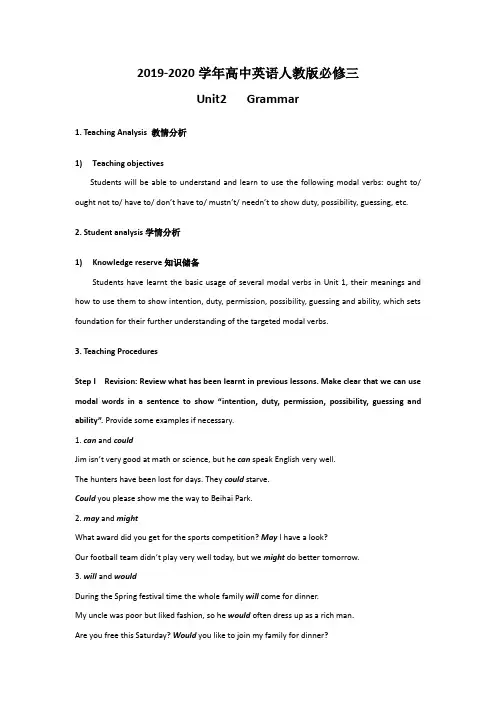
2019-2020学年高中英语人教版必修三Unit2 Grammar1. Teaching Analysis 教情分析1)Teaching objectivesStudents will be able to understand and learn to use the following modal verbs: ought to/ ought not to/ have to/ don’t have to/ mustn’t/ needn’t to show duty, possibility, guessing, etc.2. Student analysis学情分析1)Knowledge reserve知识储备Students have learnt the basic usage of several modal verbs in Unit 1, their meanings and how to use them to show intention, duty, permission, possibility, guessing and ability, which sets foundation for their further understanding of the targeted modal verbs.3. Teaching ProceduresStep I Revision:Review what has been learnt in previous lessons. Make clear that we can use modal words in a sentence to show “intention, duty, permission, possibi lity, guessing and ability”. Provide some examples if necessary.1. can and couldJim isn’t very good at math or science, but he can speak English very well.The hunters have been lost for days. They could starve.Could you please show me the way to Beihai Park.2. may and mightWhat award did you get for the sports competition? May I have a look?Our football team didn’t play very well today, but we might do better tomorrow.3. will and wouldDuring the Spring festival time the whole family will come for dinner.My uncle was poor but liked fashion, so he would often dress up as a rich man.Are you free this Saturday? Would you like to join my family for dinner?4. shall and shouldThe harvest festival begins on Sunday. We shall be there with our friends before that.When going by plane, you should arrive at the airport at least one hour early.It’s nearly time for class to start. The teacher should be here soon.5. must and can’tWhen you eat fish, you must be careful with bones.Wang Feng has won the English competition three times. He must be very smart.A man landed on Mars? You must be joking. That can’t be true.Step ⅡUnderline the sentences containing modal verbs in the reading passage and label each sentence with the function of the modal verbs used—intention, duty, permission, possibility, guessing and ability. (page13, Exercise 1)1. Underline the sentences containing modal verbs in the reading passage and use the function words below to explain the meaning of modal verbs.Suggested answers:Then by lunchtime they would all be sold. (possibility)By now his restaurant ought to be full of people. (possibility)What could have happened? (possibility)Something terrible must have happened if… (guessing)I’ll help you lose weight… (intention)He could not believe his eyes. (ability)Perhaps he should go to the library and find out. (duty)He could not have Yong Hui getting away with telling people lies! (intention)He had better do some research. (duty)Even though her customers might get thin after eating Yong Hui’s food. (possibility)They would become tired very quickly. (possibility)…could win his customer back. (ability)Step ⅢExplain the meaning and basic usage of the following modal verbs:Step ⅣUsing proper modal verbs to fill in the conversations. Exercise 2and Exercise 1on page 50.1. Choose suitable modal verbs from below to compete the following dialogues. There may be more than one possibilities.①SAM: How can I grow thinner, Mum?MUM: Well, you __________ eat food with plenty of fiber that helps you digest better and you __________ stop drinking cola or eating sweet food.SAM: Does it mean I __________ eat my favorite fried chicken any more?MUM: Not exactly, if you love fried chicken, you __________ give it up. Just eat it less often. You __________ worry too much: a little fried chicken __________ do yougood!②DOCTOR: Y ou are sick because you’ve eaten poisonous mushrooms. Where did you getthem?LUCY: I picked them in the forest. I know we __________ eat fresh vegetables.DOCTOR: Oh, but you __________ eat them until you’re sure they are not poisonous.LUCY: Thank you, doctor. I will be more careful next time.③CHARLES: I wish I could see things clearly in the dark.TOM: Eating __________ help you see better. You __________ eat some every day. Suggested answers:①have to; should; shouldn’t; needn’t; don’t have to/needn’t/shouldn’t; will②have to; mustn’t③ought to; should2. Read this dialogues and complete them with the proper modal verbs.①JOHN: We ________ get to the theater by seven. What time do you think we ________leave?SARAH: I think we ________ home at six, or we won’t arrive there in time.②GEORGE: I don’t feel well. The doctor told me that I ________ give up smoking. He alsogave me the medicine. Do you think it will do me any good?AMY: If you follow the doctor’s advice, it ________ help you.③SALESMAN: This car is one of the safest on the market. Even so, you ________ be silly anddrive without wearing a seatbelt.CUSTOMER: I ________ never do that!④RON: Let’s go to Carla’s party tonight.TOM: Well, I don’t mind going as long as I don’t ________ dress up.RON: That’s okay. You don’t even need to wear a tie if you don’t want to.⑤SUSAN: Do you know where Alan is? I ________ find him anywhere.ROBIN: W ell, he ________ have gone so far. His bag is still here.Suggested answers:①have to, should, should②ought to, should③mustn’t, would④have to⑤can’t, can’tStep ⅤSpeaking--using proper modal verbs in to make dialogues with partners. Try to use as many modal verbs as possible. Exercise 3 on page 13Now work in pairs. One of you asks a questions, the other answers it. Then swap over. Rememberto use modal verbs in your dialogues.EXAMPLE:S1: What should you do after school?S2: I have to go home at once. I need to take the bus and I have a bus card. I ought to do my homework as soon as I get home.Other possible questions are:1. Do you know what you have to do when you borrow books from the library.2. Do you know what to do when you teeth ache?3. Do you know what to do if you need to meet someone you don’t know at the airport?4. Do you know what to do if you want to get a discount in a shop?5. Do you know what you should do when you meet the hostess in your friend’s house?。
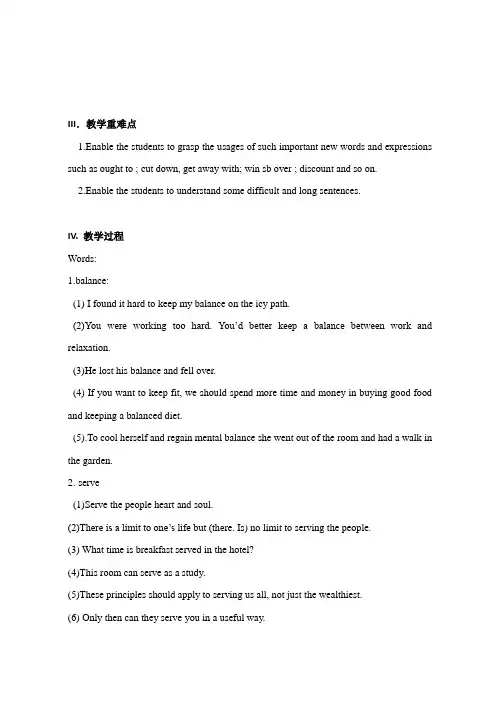
III.教学重难点1.Enable the students to grasp the usages of such important new words and expressions such as ought to ; cut down, get away with; win sb over ; discount and so on.2.Enable the students to understand some difficult and long sentences.IV. 教学过程Words:1.balance:(1) I found it hard to keep my balance on the icy path.(2)You were working too hard. You’d better keep a balance between work and relaxation.(3)He lost his balance and fell over.(4) If you want to keep fit, we should spend more time and money in buying good food and keeping a balanced diet.(5).To cool herself and regain mental balance she went out of the room and had a walk in the garden.2.serve(1)Serve the people heart and soul.(2)There is a limit to one’s life but (the re. Is) no limit to serving the people.(3) What time is breakfast served in the hotel?(4)This room can serve as a study.(5)These principles should apply to serving us all, not just the wealthiest.(6) Only then can they serve you in a useful way.3. lie(1) Korea lies on the northeast of China.(2)She lied to them about her age in order to get the job.(3)The man lying there lied that he had laid the money on the tableI like to lie on the sunny beach, treating myself to a good sunbath.(5) a white lie4.strength(1) He does weigh-training to build up his strength.(2)Everyone has his particular strength and weakness.(3)---Why do you choose to work in an international travel agency?---Well, you know, English is my strength. So it is my best choice.5.benefit(1)benefit sb.= be beneficial to sb.= be of benefit to sb.(2)The heavy rain benefits the crops very well.= The crops can benefit from the heavy rain.(3) In any case, we could enjoy the benefit.(4) I enjoyed the great benefit of his instructions concerning the matter.(5) It is not his fault. He did it for your benefit.6. consult(1) However, as she was so afraid of being laughed at by her friends, she did not consult a doctor.(2). The President consulted with European leaders before taking action.(3) Mr. Bell said he had consulted his lawyer about the matter.Phrases:1.get away with(1)For that serious accident, he got away with only a fine.(2)The thieves got away with all the money and jewellery.2.in debt(1)To be in debt is to be in danger.(2).Bad management will land the company in debt.(3) She was terrified of getting into debt.2. cut down(1) In this way they cut down the fat and increased the fiber in the meal.(2)Avoid stress foods and cut down on sugar and salt.(3)At first, you may think of ways to cut down on your expenses or increase your earnings.二.重点句型Analyzing some important and difficult sentences1. Wang Pengwei sat in his empty restaurant feeling very frustrated. (Reading)这里的feeling是-ing用做伴随状语。
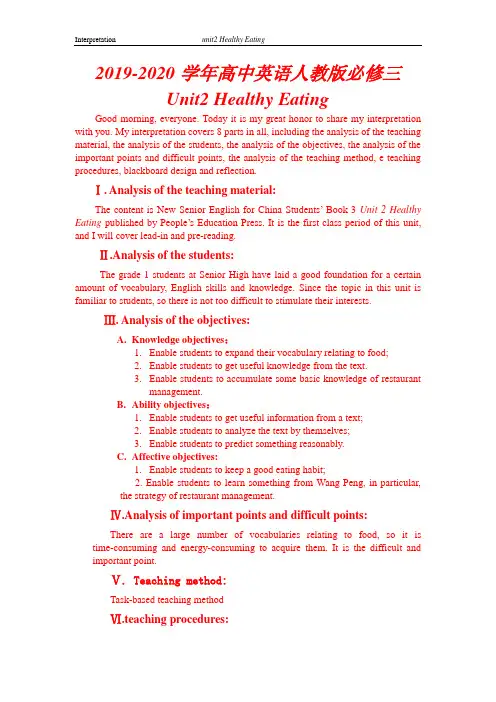
2019-2020学年高中英语人教版必修三Unit2 Healthy EatingGood morning, everyone. Today it is my great honor to share my interpretation with you. My interpretation covers 8 parts in all, including the analysis of the teaching material, the analysis of the students, the analysis of the objectives, the analysis of the important points and difficult points, the analysis of the teaching method, e teaching procedures, blackboard design and reflection.Ⅰ. Analysis of the teaching material:The content is New Senior English for China Students’ Book 3 Unit 2 Healthy Eating published by People’s Education Press. It is the first class period of this unit, and I will cover lead-in and pre-reading.Ⅱ.Analysis of the students:The grade 1 students at Senior High have laid a good foundation for a certain amount of vocabulary, English skills and knowledge. Since the topic in this unit is familiar to students, so there is not too difficult to stimulate their interests.Ⅲ. Analysis of the objectives:A.Knowledge objectives:1.Enable students to expand their vocabulary relating to food;2.Enable students to get useful knowledge from the text.3.Enable students to accumulate some basic knowledge of restaurantmanagement.B.Ability objectives:1.Enable students to get useful information from a text;2.Enable students to analyze the text by themselves;3.Enable students to predict something reasonably.C.Affective objectives:1.Enable students to keep a good eating habit;2. Enable students to learn something from Wang Peng, in particular,the strategy of restaurant management.Ⅳ.Analysis of important points and difficult points:There are a large number of vocabularies relating to food, so it is time-consuming and energy-consuming to acquire them. It is the difficult and important point.Ⅴ. Teaching method:Task-based teaching methodⅥ.teaching procedures:Step1:Lead-in: Present several pictures to students, among which one is a overweight couch potato, who is too heavy to move, the other is a skinny model, who is so thin that people can see her skeleton clearly. By analysis, I will let students to realize the importance of healthy eating.Step2: Reading: Come and Eat HereIn this part, firstly we will scan the text to get the main plot of the story. Next, we will fill a chart together to compare the two restaurants. Finally, we will overview the text to deepen understand what we have learnt.Ⅶ. Homework:A. Predict what will happen about this story, and write a follow-up.B. Each group of four has a discussion of how to keep a healthy eating. Next class, the representative of each group is required to give a presentation.Ⅷ. Blackboard design:Part 1:Ⅸ. Reflection:At the very beginning, I present several pictures to grab students’ interests in learning, which is interesting. But when it comes to the reading part, I more like an authority; in this case, students are not fully involved in the meaningful learning. And I think the multimedia facility might be a little bit overused, which a little bit constrains students thinking space. Therefore, I should take such things into consideration and make some corrections next time.Part 2:Part 3:。

2019-2020学年高中英语人教版必修三Unit2 Healthy eating说课稿一、教材分析与教材处理Come and eat here是一篇围绕本单元的中心话题healthy eating展开的叙事性文章,主要讲述了王鹏和雍慧开餐馆竞争的故事,读起来通俗易懂,而悬念式的的结尾也增添了故事的趣味性,由此学生可以在趣味横生的故事情节中学习健康饮食的知识,促使自己养成健康饮食的习惯。
在驾驭教材方面,我根据本校学生实际情况在warming—up、Pre-reading和Post-reading部分根据学生的实际情况对教材内容进行了适当的补充和修改。
二、学情分析本节课的教学对象是高一年级的学生,他们经过高一上半学期新教材的学习,已经逐步形成了一定的小组合作学习及自主学习的能力,也具备了一定的阅读能力,但还有待提高。
此外,健康饮食这一话题比较贴近生活,很容易激活学生的已有知识,便于学生开展学习活动。
三、教学目标结合单元教学要求和本课特点,依据新课程标准,具体从语言知识、语言技能、情感态度和文化意识三个方面制定如下教学目标。
1. 语言知识目标:1)使学生了解protein, calcium等基本营养成分的来源和主要功能。
2)学习掌握有关营养成分与食物的词汇,如:protein、calcium 、carbohydrate 、fibre、 mineral、 vitamin 、vegetarian & vegan、 green food and clean food 、eco-food and organic food等2. 语言技能目标:1)使学生学会克服生词障碍,通过略读,寻找文章的主题句,理清文章的总体框架与脉络;通过查读,捕捉文章的重要细节,理解作者的写作意图。
2)使学生学会运用各种猜词技巧,猜测部分生词在具体的语言环境的含义。
3.情感态度与文化意识目标:1)使学生养成健康饮食习惯的意识,领悟膳食平衡对身体健康的作用。
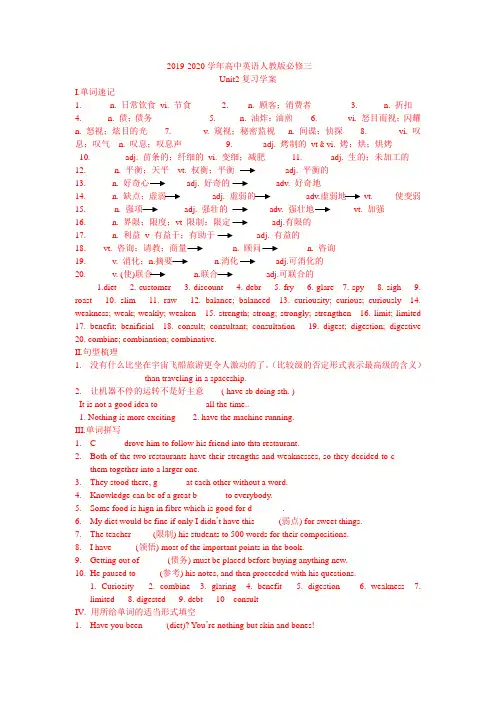
2019-2020学年高中英语人教版必修三Unit2复习学案I.单词速记1.______ n. 日常饮食vi. 节食2.____ n. 顾客;消费者3. _____ n. 折扣4. _____ n. 债;债务5._____ n. 油炸;油煎6. ______ vi. 怒目而视;闪耀n. 怒视;炫目的光7. ______ v. 窥视;秘密监视n. 间谍;侦探8. ______ vi. 叹息;叹气n. 叹息;叹息声9. ______ adj. 烤制的vt & vi. 烤;烘;烘烤10. _______ adj. 苗条的;纤细的vi. 变细;减肥11.______ adj. 生的;未加工的12.______ n. 平衡;天平vt. 权衡;平衡______ adj. 平衡的13. _____ n. 好奇心____ adj. 好奇的______ adv. 好奇地14. _____ n. 缺点;虚弱______ adj. 虚弱的_______ adv.虚弱地vt._____使变弱15.______ n. 强项_____ adj. 强壮的_____ adv. 强壮地_____vt. 加强16. _____ n. 界限;限度;vt 限制;限定_____ adj.有限的17. _____ n. 利益v 有益于;有助于_____ adj. 有益的18. ___ vt. 咨询;请教;商量______ n. 顾问______ n. 咨询19. _____ v. 消化;n.摘要_____ n.消化____ adj.可消化的20. _____ v. (使)联合_____ n.联合______adj.可联合的1.diet2. customer3. discount4. debr5. fry6. glare7. spy8. sigh9. roast 10. slim 11. raw 12. balance; balanced 13. curiousity; curious; curiously 14. weakness; weak; weakly; weaken 15. strength; strong; strongly; strengthen 16. limit; limited 17. benefit; benificial 18. consult; consultant; consultation 19. digest; digestion; digestive 20. combine; combiantion; combinative.II.句型梳理1.没有什么比坐在宇宙飞船旅游更令人激动的了。
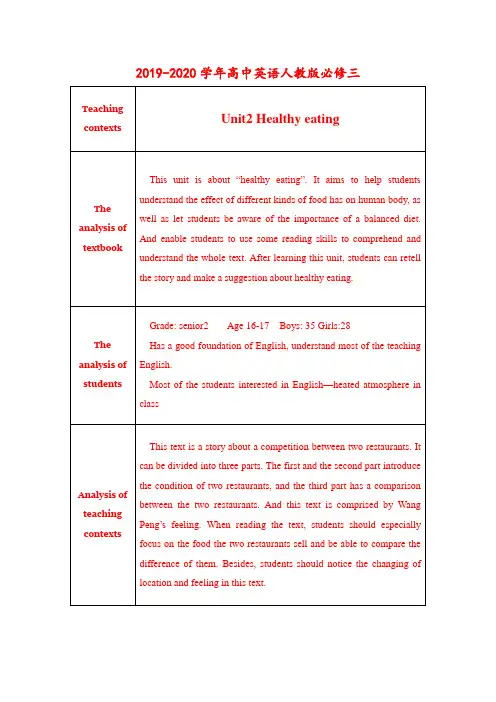
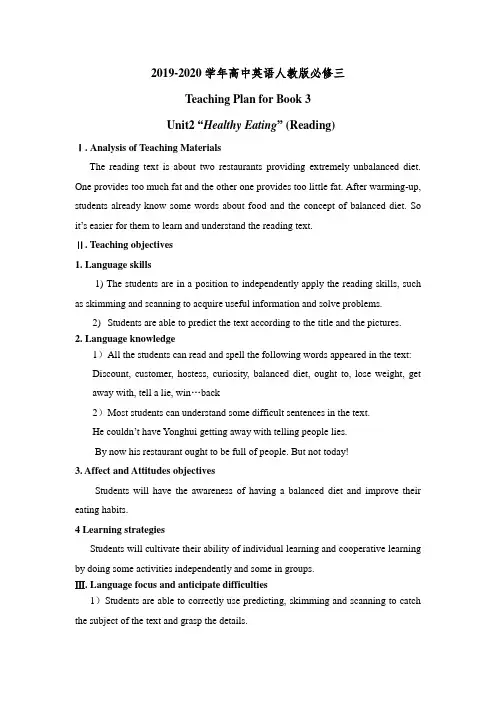
2019-2020学年高中英语人教版必修三Teaching Plan for Book 3Unit2 “Healthy Eating” (Reading)Ⅰ.Analysis of Teaching MaterialsThe reading text is about two restaurants providing extremely unbalanced diet. One provides too much fat and the other one provides too little fat. After warming-up, students already know some words about food and the concept of balanced diet. So it’s easier for them to learn and understand the reading text.Ⅱ. Teaching objectives1. Language skills1) The students are in a position to independently apply the reading skills, such as skimming and scanning to acquire useful information and solve problems.2)Students are able to predict the text according to the title and the pictures.2. Language knowledge1)All the students can read and spell the following words appeared in the text: Discount, customer, hostess, curiosity, balanced diet, ought to, lose weight, get away with, tell a lie, win…back2)Most students can understand some difficult sentences in the text.He couldn’t have Yonghui getting away with telling people lies.By now his restaurant ought to be full of people. But not today!3. Affect and Attitudes objectivesStudents will have the awareness of having a balanced diet and improve their eating habits.4 Learning strategiesStudents will cultivate their ability of individual learning and cooperative learning by doing some activities independently and some in groups.Ⅲ. Language focus and anticipate difficulties1)Students are able to correctly use predicting, skimming and scanning to catch the subject of the text and grasp the details.2) It is so important for students to master the new words.3) Students can make a menu of balanced diet.Ⅳ. Teaching methodsTask-based activitiesⅤ. Teaching aidsA computer and a projectorⅥ. Teaching proceduresStep1 Lead-in (3min) (Individual work)Activity: Show the picture of food pyramid.Q: Do you like eating snacks? But we shouldn’t eat too much.What should we eat most/much/some every day?What will happen to us if we don’t eat a balanced diet?→gain weight, sick, tired Do you think a restaurant will provide a balanced menu?(Design intent: this step aims to arouse the Ss’ background information of balanced diet. Then students will be mentally prepared for reading comprehension.)Step2 Pre-reading: Predicting (2min)(Individual work)Teacher asks Ss to read the title “Come and eat here” and predict the content of the passage with the help of pictures.Where? Who? What?(Design intent:Prediction is an important reading skill in doing reading comprehension, and Ss are required to master it. It just aims to help Ss develop the reading skill of prediction.)Step 3 While-reading (24min) (Individual work and Pair work)Activity1: Skimming (3min)(Individual work)1. Skim the passage and find out the characters in the text.2.Match the main idea of each paragraph.Para.1 Wang Peng’s restaurant and his menuPara.2-3 Yong Hui’s restaurant and menuPara.4 Wang Peng’s researchActivity2: Scanning (2min) (Pair work)What food does Wang Peng’s and Yong Hui’s restaurants offer? Scan the passage and finish their menus.Activity3: Detailed reading (18min) (Individual work and Pair work) Part 1.1. How did Wang Peng feel about his food?Find evidence in the passage to support your idea.A.proudB. annoyedC. disappointedD. critical(批判)Nothing could be better!There should be lots of customers. But …what happened today?How did Wang Peng feel this morning? Why?Frustrated.↓1). By lunch time, his restaurant was ______, which ___________ full of people.2). Li Chang was not coming to eat in Wang Peng’s restaurant ____ he always did.Part 2.1. What did Wang Peng do then? What did he find?Yong Hui’s new restaurant which only offers slimming food.2. How did Wang Peng feel about the slimming restaurant?3. What was Wang Peng amazed at? price, food4.. Look at their menus, did they offer balanced menu?Look at the statements and judge T or F. And correct them.1). Yonghui aimed to make people slim by providing slimming food.2). Yonghui’s menu gave customers more energy-giving food.3). Wang Peng’s menu gave customers more protective food.4). Wang Peng admired Yonghui’s restaurant when he saw the menu.He could not believe his eyes. He threw down the menu and hurried outside. On his way home he thought about his own menu. Did it make people fat? Perhaps he should go to the library and find out. He could not have Yong Hui getting away with telling people lies!T: What does the ‘lies’ refer to?A.Yong Hui’s food is healthier than Wang Peng’s.B.Yong Hui’s food is more expensive than Wang Peng’s.C.Yong Hui is an excellent cook.Part 31. What did he find? How did Wang Peng feel at the library?2. What will happen to people who often eat at Wang Peng’s and at Yong Hui’s?3. How did he feel after the research? What did he want to do ?He thought he could win his customs back. With a discount and a new sign.T: So the competition between the two restaurants was on. What does it mean? Andy, please. I like your answer. The competition began.(Design intent: It is important to get the Ss read the text for 3 times. By doing these activities, the Ss will develop their reading strategies and language efficiency. Teacher helps Ss study the passage paragraph by paragraph. Ss will learn some key words and phrases by guessing the meanings. The aim of activity1 is to let the Ss have a comprehensive understanding of the whole passage. This pattern will reduce the difficulty and let the Ss finish this task quickly. While the purpose of scanning is to let the Ss find out some details that are relatively easy for them to do. In the detailed-reading part, the Ss should not only find out the details, but also go deep into the passage. This step trains Ss how to find answer quickly and correctly.)Step 4 Post-reading ( 10min) (Group work)1. Design a new menu.Our food gives you energy all day !Discuss in groups of 4 and help him design a new menu which will help win the customers back. Then do a report.Note: Does your food make customers feel fit?Does your food provide customers energy?Does your food serve a balanced diet?2.Everybody wants to be fit and slim. What can we do to keep slim?exercise+dietT: We are what we eat. So we should have a healthy and balanced diet. As the famous saying goes, “First wealth is health.”(Design intent: the purpose of this step is to help the Ss catch the important points of this class, and use what they have learnt in this class to make a menu of balanced diet. What is more, Ss will cultivate the good habits of cooperation and independently thinking in the process of accomplishing the learning tasks.The second question aims to help Ss improve their eating habits and eat healthy. )Step 5 Homework (1min) (Individual work and Pair work)1.How do you think the story will end? Give a possible development.2.Find out the useful words and expressions and remember them.(Design intent: This step will simulate Ss to be cooperative and the awareness of self-learn more after class. At the same time, Ss can consolidate the key words and practice to use them.)Ⅶ. Blackboard designUnit 2 Healthy Eating--readingⅧ. Teaching reflection (This part will be finished after class)。
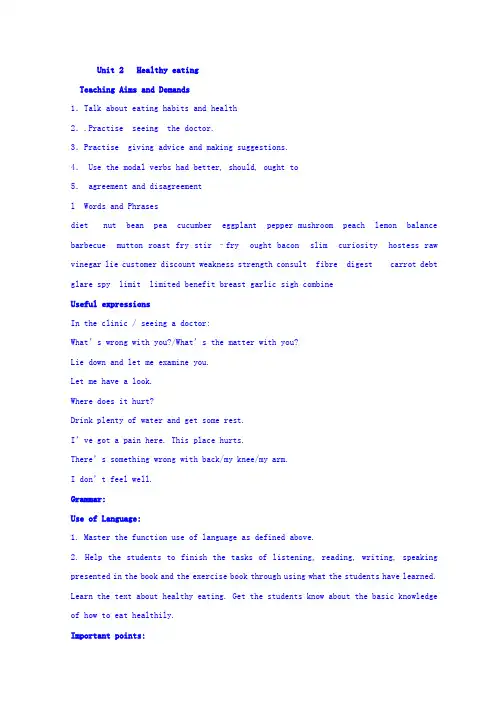
Unit 2 Healthy eatingTeaching Aims and Demands1.Talk about eating habits and health2..Practise seeing the doctor.3.Practise giving advice and making suggestions.4. Use the modal verbs had better, should, ought to5. agreement and disagreementl Words and Phrasesdiet nut bean pea cucumber eggplant pepper mushroom peach lemon balance barbecue mutton roast fry stir –fry ought bacon slim curiosity hostess raw vinegar lie customer discount weakness strength consult fibre digest carrot debt glare spy limit limited benefit breast garlic sigh combineUseful expressionsIn the clinic / seeing a doctor:What’s wrong with you?/What’s the matter with you?Lie down and let me examine you.Let me have a look.Where does it hurt?Drink plenty of water and get some rest.I’ve got a pain here. This place hurts.There’s something wrong with back/my knee/my arm.I don’t feel well.Grammar:Use of Language:1. Master the function use of language as defined above.2. Help the students to finish the tasks of listening, reading, writing, speaking presented in the book and the exercise book through using what the students have learned. Learn the text about healthy eating. Get the students know about the basic knowledge of how to eat healthily.Important points:1. Talk about different kinds of food that one favorites.2. learn the basic knowledge of healthy eating.3. learn how to say in the clinic.4. Grasp the language points and grammar in the text.Difficult points:The use of modal verbs --- had better, should and ought to.Teaching aids:computer or slider-projectorWay of Teaching:Communication way of teaching, discussion and group work.period 1Teaching aims and demands1. Talk about eating habits and health2. Practise seeing the doctor.3. Practise giving advice and making suggestions.Main and difficult pointsPractise my students’ oral English and make them know what expressions they can use when they see the doctor and try to practice giving advice and making suggestions. Step 1 Lead inFirst show the students some pictures of dishes and introduce the topic of this unit. Step 2 Warming-UpAnd then show the pictures on their text books and let them to decide what is junk food and what is not.Here the students may have a short ask and answer in pairs to themselves more engaged in the topic.Junk foods: Hamburger, Chocolate …Healthy foods: rice …Step 3There are so many foods. And if we do not eat them properly we may be ill because of it. For example in our spring festival sometimes we may have stomachache if we eat too much. Then we have to see a doctor.Step 4 HomeworkPrepare for the next class.Collect some menus if possible for the next class.Step 5 sum upRecord of teaching:2019-2020年高中英语必修三教案:unit2Teaching aims and demands1. To improve my students’ reading ability.2. To be more knowledgeable by reading the passage.3. Try to form healthy eating habits.Main pointsTo improve my students’ reading ability.Difficult points1. To improve my students’ reading ability.2. To be more knowledgeable by reading the passage.Teaching methods:Discussion: from the discussion let every student work in class and encourage them to have their own opinion.Teaching aids:Slide, tape recorder.Step 1 IntroductionUsing the questions to introduce the new text.Step 2 pre-reading (show on the screen)1. What do you think should go into a good meal?( A good meal should contain some food from each of the three categories above .)2. why Wang peng’s restaurant is empty?( Because some people go to a new restaurant .)Step 3 Carefully-readingLanguage points :a.Wang Peng sat in his empty restaurant feeling very frustrated.This sentence means that the second action “feeling very frustrated”happened together with the main action “sat”. Pay attention to the form (v-ing) of the second action.b. Nothing could have been better.This sentence tells us that everything has worked out the way you would like. It’s a sentence that we can use in any situation.c. He couldn’t have Yong Hui getting away with telling people lies!This sentence means that he will punish Yong Hui for her telling lies.1)lie : something untrueA white lie isn’t going to hurt anyone .2) say something which is not trueHe lied to his wife so that he could come home late .d : she did not look happy but glared at himglare stare and gazeglare : to look in an angry wayeg : they stopped arguing and glared at each other.Stare : to look steadily for a long timeeg: the old man stared up and down at the uninvited guest.gaze: to look steadily ,esp ,for a long time and often without being conscious of what one is doingeg: she turned to gaze admiringly at her husband .Step 4 DiscussionAsk the students to take out their menus and read them carefully. Then discuss what kind of food they want to recommend to their friends or families.Step 5 Sum up.Step 6 HomeworkFinish the exerciseStep 7 The design of the blackboard.We are what we eatStep 8 The record after teaching.Period 3Teaching aims and demands1. Have a deeper understanding of the passage.2. Master some important points of the text.3. Improve my students’ comprehensive ability.Main and difficult pointsSome important points of the text.Teaching method:First T gives some important points. Then let students find out their difficult points and ask some students to answer. If they cannot then T answers it.Teaching aids:SlideStep 1 RevisionCheck the homework.Review what we learnt in last periodStep2T gives some important points to students.1. By now his restaurant ought to be full of people .Ought ( oughtn’t ) to : should(应当,应该)We ought to respect not only own privacy, but also that of others.你不该抽那么多烟。
2019-2020学年高中英语人教版必修三Unit 2 Healthy eating 单元复习学案一、单词拼写 (基础题)1. ___________ v.&n. 平衡2. ___________ n.&v.日常饮食3. ___________ adj.&v. 苗条的,变细4. ___________ n. 好奇心5. ___________ adj.生的;未加工的6. ___________ n. 顾客,消费者7. ___________ n. 强项,力量8. ___________ n.折扣9. ___________ v. 咨询,请教二、在空格处填写单词的正确形式(基础题)1. To succeed, we must _________________(结合) talent with working hard.2. He has been working for a long time, but he is still full of e_____________.3. You should do some r______________ before making the final decision.4. Children are always full of c____________; they want to know everything.5. What will happen if you do not eat a b_____________ diet?6. We need both competition and _________________(合作).7.Mary has been on a________(节食) for weeks but still hasn’t lost any weight.8.He pushed against that big stone with all his________(力气).9.There is a time________(限制):you must finish it in 30 minutes.10.The two men in the fight________(怒目而视) at each other.11.You will________(受益) a lot from morning exercises.12.Don’t be particular about food.A________(平衡) diet is very important for health.13.We aim to offer good value and service to all our________(顾客).14.He thought that crying was a sign of________(软弱).15.I have________(查阅) a number of law books in the British Museums.三、词语派生 (基础题)9._____________ vt.限制;限定n.界限;限度→ _______________adj.有限的10._____________ vt.&vi.(使)联合;(使)结合→______________ n .联合;结合 10. ___________ n.&v. 利益;有助于 11. ___________ v.&n. 限制;限定 12. ___________ v. 使结合 13. ___________ v.& n. 怒视 14. ____________ n. 债务 15. ____________ n.&v. 间谍;窥探 16. ____________ n.合作;协作 17. ____________ n.女主人;女主持人 18. ____________ n.&v. 叹息;叹气 19. ___________ n. 缺点,虚弱11._____________ n.好奇心→ ________________adj.好奇的12.____________n.强项;长处;力量→______________vt.加强;巩固→ ______________adj.强壮的;坚强的13.______________n.利益;好处_____________ vt.& vi.有益于;有助于;受益→ ______________adj.有益的;有利的四、词组翻译(基础题)1.______________体重减轻;减肥2.______________ 被放过;(做坏事)不受惩罚3.______________ 说谎4.______________ 赢回;重新获得5._______________谋生6._______________ 欠债7.______________ 暗中监视;侦查8.______________ 削减;删节9.______________ 不久以后10.______________增加体重11.______________ 节食12.______________ 怒目而视五、词组运用(基础题)根据语境,用所学短语的适当形式填空。
2019-2020学年高中英语人教版必修三Unit 2 Healthy Eating一、说教材(一)说教材的地位和作用本课是人民教育出版社高中英语必修三第二单元第一课时的内容。
本单元的中心话题是“Healthy E ating”,它是中学生日常生活接触比较多而且比较感兴趣的话题之一,本单元的各项活动的设计都是围绕着饮食展开的。
涉及的主要内容有:饮食问题以及饮食均衡营养。
本课时通过垃圾食品与健康食品对比,突出健康的饮食的重要性。
本课时是本单元的第一课时,它为本单元的第二篇Reading 打基础。
本课时的学习不但能使学生掌握相关的单词和短语,提高学生的阅读能力,还能帮助了解生活中健康的饮食,让学生熟悉和掌握不同种类食物,了解健康的饮食重要性,使学生更加关注自身的饮食,调节饮食做到营养均衡,从而养成好的饮食习惯,促进身体健康。
(二)教学目标:根据《课程标准》,本单元要求依据高二年级学生特点确定以下目标:1 知识与技能(1)学生能理解和掌握新单词短语,尤其是与饮食相关的词汇,如:diet, barbecue, mutton, roast, fry, ought to, lose weight, slimming, win back, tell lies等等。
(2)学生能掌握并灵活运用情态动词短语的肯定与否定表达:ought to-ought not to, have to-don’t have to, mustn’t, needn’t.(3)学生能够准确把握长句的复杂结构,精确理解文章含义,提升阅读技能与语言表达能力。
2 过程与方法(1)通过诵读法并结合例句呈现的方式来讲解使学生掌握新词与短语。
(2)通过专题讲解和例句呈现的方式来引导学生掌握几组情态动词短语的用法与含义,同时用练习的方式加以巩固。
(3)通过阅读训练与练习相结合的方式,帮助学生理解文章和提升阅读技能。
3 情感、态度与价值观通过有趣生动的主题内容的学习增强学生对于英语学习的兴趣,同时养成健康饮食的生活观,有意识且知道如何Balance Your Diet.(三)教学重点难点及确定依据根据课程标准,本课时的重点、难点如下:1教学重点:(1)学生能理解和掌握新单词短语,尤其是与饮食相关的词汇,如:diet, barbecue, mutton, roast, fry, ought to, lose weight, slimming, win back, tell lies等等。
2019-2020学年高中英语人教版必修三Unit 2 Healthy eating一.将下列生词和短语的表达方式写在右边的横线上。
1. 好奇心_______________2. 女主人______________3. 顾客____________________4. 折扣_________________5. 缺点,弱点,虚弱______________6. 强项,长处,力量_____________7. 咨询;请教;商量______________ 8. 怒目而视____________9. 限制;限定________________ 10. 利益,好处;有益于____________11. (使)联合___________12. 平衡___________________13. 日常饮食_________________ 14. 应该__________________15. 体重减轻_______________ 16. 赢回____________________17. 谋生__________________ 18. 增加体重______________19. 说谎____________________ 20. cut down________________21. in debt_________________ 22. spy on___________________23. get away with_______________________________________24. before long_______________ 25. obesity__________________26. sign__________________27. flavour__________________28. digest____________________ 29. protein_________________二、重点单词及词组1. balance n 天平,平衡常见搭配:keep one’s balance 保持平衡lose one’s balance 失去平衡out of balance 不平衡a sense of balance 平衡感vt 平衡He can balance a ball on his finger. 他能把球稳放在手指上。
Unit2 GrammarGrammar—Modal Verbs1. Teaching Analysis 教情分析1)Teaching objectivesStudents will be able to understand and learn to use the following modal verbs: ought to/ ought not to/ have to/ don’t have to/ mustn’t/ needn’t to show duty, possibility, g uessing, etc.2. Student analysis学情分析1)Knowledge reserve知识储备Students have learnt the basic usage of several modal verbs in Unit 1, their meanings and how to use them to show intention, duty, permission, possibility, guessing and ability, which sets foundation for their further understanding of the targeted modal verbs.3. Teaching ProceduresStep I Revision:Review what has been learnt in previous lessons. Make clear that we can use modal words in a sentence to show “intention, duty, permission, possibility, guessing and ability”. Provide some examples if necessary.1. can and couldJim isn’t very good at math or science, but he can speak English very well.The hunters have been lost for days. They could starve.Could you please show me the way to Beihai Park.2. may and mightWhat award did you get for the sports competition? May I have a look?Our football team didn’t play very well today, but we might do better tomorrow.3. will and wouldDuring the Spring festival time the whole family will come for dinner.My uncle was poor but liked fashion, so he would often dress up as a rich man.Are you free this Saturday? Would you like to join my family for dinner?4. shall and shouldThe harvest festival begins on Sunday. We shall be there with our friends before that.When going by plane, you should arrive at the airport at least one hour early.It’s nearly time for class to start. The teacher should be here soon.5. must and can’tWhen you eat fish, you must be careful with bones.Wang Feng has won the English competition three times. He must be very smart.A man landed on Mars? You must be joking. That can’t be true.Step ⅡUnderline the sentences containing modal verbs in the reading passage and label each sentence with the function of the modal verbs used—intention, duty, permission, possibility, guessing and ability. (page13, Exercise 1)1. Underline the sentences containing modal verbs in the reading passage and use the function words below to explain the meaning of modal verbs.Suggested answers:Then by lunchtime they would all be sold. (possibility)By now his restaurant ought to be full of people. (possibility)What could have happened? (possibility)Something terrible must have happened if… (guessing)I’ll help you lose weight… (intention)He could not believe his eyes. (ability)Perhaps he should go to the library and find out. (duty)He could not have Yong Hui getting away with telling people lies! (intention)He had better do some research. (duty)Even though her customers might get thin after eating Yong Hui’s food. (possibility)They would become tired very quickly. (possibility)…could win his customer back. (ability)Step ⅢExplain the meaning and basic usage of the following modal verbs:Step ⅣUsing proper modal verbs to fill in the conversations. Exercise 2 and Exercise 1 on page 50.1. Choose suitable modal verbs from below to compete the following dialogues. There may be more than one possibilities.①SAM: How can I grow thinner, Mum?MUM: Well, you __________ eat food with plenty of fiber that helps you digest better and you __________ stop drinking cola or eating sweet food.SAM: Does it mean I __________ eat my favorite fried chicken any more?MUM: Not exactly, if you love fried chicken, you __________ give it up. Just eat it less often. You __________ worry too much: a little fried chicken __________ do you good!②DOCTOR: Y ou are sick because you’ve eaten poisonous mushrooms. Where did you get them?LUCY: I picked them in the forest. I know we __________ eat fresh vegetables.DOCTOR: Oh, but you __________ eat them until you’re sure they are not poisonous.LUCY: Thank you, doctor. I will be more careful next time.③CHARLES: I wish I could see things clearly in the dark.TOM: Eating __________ help you see better. You __________ eat some every day.Suggested answers:①have to; should; shouldn’t; needn’t; don’t have to/needn’t/shouldn’t; will②have to; mustn’t③ought to; should2. Read this dialogues and complete them with the proper modal verbs.①JOHN: We ________ get to the theater by seven. What time do you think we ________ leave?SARAH: I think we ________ home at six, or we won’t arrive there in time.②GEORGE: I don’t feel well. The doctor told me that I ________ give up smoking. He also gave me themedicine. Do you think it will do me any good?AMY: If you follow the doctor’s advice, it ________ help you.③SALESMAN: This car is one of the safest on the market. Even so, you ________ be silly and drive withoutwearing a seatbelt.CUSTOMER: I ________ never do that!④RON: Let’s go to Carla’s party tonight.TOM: Well, I don’t mind going as long as I don’t ________ dress up.RON: That’s okay. You don’t even need to wear a tie if you don’t want to.⑤SUSAN: Do you know where Alan is? I ________ find him anywhere.ROBIN: Well, he ________ have gone so far. His bag is still here.Suggested answers:①have to, should, should②ought to, should③mustn’t, would④have to⑤can’t, can’tStep ⅤSpeaking--using proper modal verbs in to make dialogues with partners. Try to use as many modal verbs as possible. Exercise 3 on page 13Now work in pairs. One of you asks a questions, the other answers it. Then swap over. Remember to use modal verbs in your dialogues.EXAMPLE:S1: What should you do after school?S2: I have to go home at once. I need to take the bus and I have a bus card. I ought to do my homework as soon as Iget home.Other possible questions are:1. Do you know what you have to do when you borrow books from the library.2. Do you know what to do when you teeth ache?3. Do you know what to do if you need to meet someone you don’t know at the airport?4. Do you know what to do if you want to get a discount in a shop?5. Do you know what you should do when you meet the hostess in your friend’s house?。
2019-2020学年高中英语人教版必修三导学案Unit2 Healthy EatingClass:___________ No: _____ Group:_________ Name:___________Part 1 Words and Expressions【使用说明与学法指导】1.预习案:I. 练读词汇表、听录音跟读。
II. 熟背词汇拓展表。
2.练习案:堂上使用或课后作业,熟读熟记。
【学习目标】1.熟读掌握本单元词汇表,并记住适当的拓展词汇。
2.对本单元的词汇熟练运用。
3.能够在课文阅读中加深对词汇的理解和运用。
【预习案】【训练案】一、单词填空1. A balanced(均衡的)diet provides nutrition for your body, as is known to us.2. They were very curious (好奇的)about the people who lived upstairs.3. They were selling everything at a discount (折扣,打折).4. The teaching of history should not be limited (限制) to dates and figures.5. I stopped worrying and started advertising the benefits (好处,利益)of my food.6. We are still looking for someone who combines (联合,结合)all the necessary qualities.7. He has been working for a long time, but he is still full of energy(能量).8. The boy lifted the stone with all his strength(力量).9. This restaurant was not giving its customers(顾客) energy-giving food.10.11. Don't glare (怒目而视) at me like that, you deserved the scolding.12. Have you consulted (咨询,请教) your physician about possible treatments?13. The leaves of certain trees are poisonous (有毒的)to cattle.14. We would be grateful for your cooperation (合作,协作)in clearing the hall as quickly as possible.15. You should allow a little time after a meal for the food to digest (消化).二、单句语法填空1.Due to curiosity (curious), he squeezed himself into the crowd to see what had happened.2.Losing one’s temper is often seen as a sign of weakness. (weak)3.The team won at last because these players made a very good combination. (combine). 4.You’d better take into account your own strengths (strong) and weaknesses before choosing a major.5.His work as a consultant (consult) consisted in advising foreign companies on the siting(选址) of new factories6.Protective gloves reduce the absorption(吸入) of chemicals through the skin. 7.There was a child lying (lie) on the ground.8.Each person's signature (sign) is unique.9.No liquids are served with meals because they interfere(干扰) with digestion (digest).10.Learning to be cooperative(cooperate) is good for us.三、填上合适的短语1. After the scandal, he faces a hard struggle to win back (赢回) public support before the next election.2. She has been earning her living (谋生) by teaching since she graduated from college.3. If you cheat in the exam, you can hardly get away with (摆脱惩罚) it.4. I spent an hour every day taking exercise in order to lose weight. (减肥)5. He tried hard to stay awake, but before long (不久) he fell asleep.Part 2 Language Points in Reading 1【使用说明与学法指导】1.预习部分:I. 精读课文,互译文中的词汇、句型及语法结构。
2019-2020学年高中英语人教版必修三 Unit2复习学案(适用于普通班):《普通高中英语课程标准》词汇知识内容要求(必修)1.借助词典等各种资源,理解语篇中关键词的词义和功能以及所传递的意图和态度等2.了解词汇的词根,词缀,掌握词性变化规律,并用于理解和表达有关主题的信息和观点3.在语境中,根据不同主题,运用词汇命名相关事物,进行指称,描述行为,过程和特征,说明概念等Learning aims:1.To teach the students how to learn vocabulary and build up confidence in learning English2.To get the students to master the key words and phrases in this unit3.To get the students to use what they have learnt to improve their reading and writing4.To make the students realize the importance of healthy eating课前案A journey of a thousand miles begins with one single step —千里之行,始于足下Wang Peng sat in his empty restaurant 1. ____ (feel) very frustrated, for people were going to Yong Hui ’s newly-opened restaurant. Driven by2. ______( curious) , he 3. ____( spy) on Yong Hui and she4. ___(瞪了一眼 )at him angrily. He found people went there to eat raw vegetables to 5.______(减肥) . After doing some research, he wrote his own sign 6. ____ (win) customers back . A week later, Wang Peng ’s restaurant was nearly full, 7. ____ made Yong Hui very angry. Having had a good conversation, both of them realized the 8.________ (strength) and weaknesses of their own restaurants and decided to provide a 9. ____(balance) one 10.______( combine) the two . Finally they succeeded and got married, working and living together happily.课中案要词热语,追型逐句1. lie 经典例句My mother won ’t have me lying to her no matter what happens.At the top of the hill lies an old temple dating back to the Ming Dynasty. 用法归纳一个善意的谎言_____________向我撒谎___________________________ 在于努力__________________ 练一练:Judging from his expression, we knew that he was__________ (lie) to us. The survivors ______( lie ) on the beach, exhausted and shocked. He ____( lay) the book and just sat there, lost in thought. 众所周知,好的生活在于好的健康。